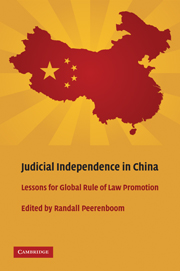Book contents
- Frontmatter
- Contents
- Contributors
- 1 Introduction
- 2 Halfway Home and a Long Way to Go
- 3 A New Approach for Promoting Judicial Independence
- 4 The Party and the Courts
- 5 Judicial Independence in China
- 6 A New Analytic Framework for Understanding and Promoting Judicial Independence in China
- 7 Judicial Independence and the Company Law in the Shanghai Courts
- 8 Local Courts in Western China
- 9 The Judiciary Pushes Back
- 10 Corruption in China's Courts
- 11 A Survey of Commercial Litigation in Shanghai Courts
- 12 Judicial Independence in Authoritarian Regimes
- 13 Judicial Independence in East Asia
- Index
- References
1 - Introduction
Published online by Cambridge University Press: 05 June 2012
- Frontmatter
- Contents
- Contributors
- 1 Introduction
- 2 Halfway Home and a Long Way to Go
- 3 A New Approach for Promoting Judicial Independence
- 4 The Party and the Courts
- 5 Judicial Independence in China
- 6 A New Analytic Framework for Understanding and Promoting Judicial Independence in China
- 7 Judicial Independence and the Company Law in the Shanghai Courts
- 8 Local Courts in Western China
- 9 The Judiciary Pushes Back
- 10 Corruption in China's Courts
- 11 A Survey of Commercial Litigation in Shanghai Courts
- 12 Judicial Independence in Authoritarian Regimes
- 13 Judicial Independence in East Asia
- Index
- References
Summary
This is the first book in English on judicial independence in China. This may not seem surprising given China remains an effectively single-party socialist authoritarian state, the widely reported prosecutions of political dissidents and the conventional wisdom that China has never had independent courts. On the other hand, this may seem surprising given that China has become a possible model for other developing countries – a model that challenges key assumptions of the multibillion-dollar rule of law promotion industry, including the central importance of judicial independence for all we hold near and dear. Although China's success in achieving economic growth and reducing poverty is well known, less well known is that China outscores the average country in its income class, including many democracies, on many rule of law and good governance indicators, as well as most major indicators of human rights and well-being, with the notable exception of civil and political rights. How has China managed all this without independent courts?
WHY STUDY JUDICIAL INDEPENDENCE IN CHINA?
There are few ideas more cherished, and less critically scrutinized, than judicial independence. Judicial independence is regularly portrayed as essential to rule of law, good governance, economic growth, democracy, human rights, and geopolitical stability.
- Type
- Chapter
- Information
- Judicial Independence in ChinaLessons for Global Rule of Law Promotion, pp. 1 - 22Publisher: Cambridge University PressPrint publication year: 2009
References
- 6
- Cited by



